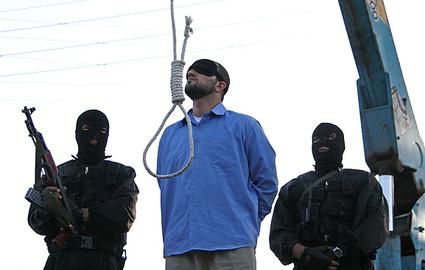
Emadeddin Baghi is a human rights activist, historian, theologian and investigative journalist who has spent many years promoting and supporting the “right to life”.
He is the founder and head of the Committee for the Defense of Prisoners' Rights, is a member of the central council of the Society to Defend Freedom of the Press, and is the founder of the Society of Right to Life Guardians in Iran. He has the author of 27 books and many articles on democracy and human rights.
While studying theology, he received a master’s degree in sociology and has always been an active campaigner against capital punishment. He is the recipient of a number of distinguished awards for his writing and activities, including the International Journalist Award from the British Press Awards (2008) and the Human Rights Prize of the French Republic (2005). In 2004, he was awarded the Civil Courage Prize from the American Parkinson Fund (2004), alongside Zimbabwean opposition leader Lovemore Madhuku. He was prohibited from leaving Iran to receive the prize.
Iranian authorities have arrested Baghi many times on vague charges and have sentenced him to various prison terms, which have later been shortened or suspended.
Iranwire interviewed him about his call for a referendum on the death penalty.
[Note: Under Islamic law, when a killing is considered to be “private”, the victim’s next of kin has the right to decide what sort of “retribution” is acceptable. They choose whether to condemn the killer to death, forgive them, or demand financial compensation.]
For many years, you have supported the abolition of the death penalty. But isn’t it better to have a referendum to approve or eliminate the death penalty?
In every country, including Iran, a referendum is subject to the particular rules of that country. Therefore, we should confront the question from a theoretical level rather than from the particulars of a legal context.
I have laid out the principles of the discussion in three earlier books, Death Penalty and Retribution, The Right to Life 1 and the Right to Life 2. I will partly rely on the arguments set out in these publications to answer.
The question sounds simple but its legal, religious and sociological aspects are complex and entangled. One cannot answer a scientific question with slogans. In a society like Iran, or even other Islamic countries, one cannot be presented with an answer that is exclusively religious, legal or sociological. If capital punishment can be subject to a referendum, we must clarify on what basis this is possible. If it is not possible, why not?
Is retribution an individual right or a public one? In answer to protests by human rights organizations, members of the judiciary have stated that Iranian law considers retribution to be a private matter, one that the government cannot prevent, even though it is responsible for defending the rights of its people.
However, if a murder is committed as a result of someone going against Islam, then it becomes a public right and the magistrate can decide whether to punish or forgive.
But in my view, retribution is not only a private right. The Quran has recognized it as both a private and a social right.
Then shouldn’t we prepare the ground for the intervention of society when it comes to the question of retribution?
Yes. I believe that death is a social question not a personal right. As such, society must participate in making the decision. The Quran is clear on this: “Whoever kills an innocent life it would be as if he has slain all humanity, and whoever saves a life, it would be as if he has brought life to all mankind.” (Al-Maeda chapter, verse 32.) This verse clearly states that the life and death of a person is a social question, not a personal one, and equates the life of one person to the life of the society. If there was more of an understanding on this point, the consequences could be significant.
Even if retribution is a personal right, it cannot repudiate the social dimension and is bound by limitations. Emphasis on the private aspect of the right is a hallmark of modern and advanced jurisprudence; likewise, Islamic law does not allow the violation of personal rights. But the question of human life (whether the person is guilty or not guilty) is so important that it has become an exception. In various ways, the personal right has been limited by the public one.
Isn’t the Sunni interpretation, however, different from the Shiite interpretation of this question?
Yes. In Sunni jurisprudence, if the victim is survived by more than one family member and one of them forgives the person responsible for the crime, then retribution is nullified, even if others want it. For Shiites, however, only the consent of all next of kin would nullify the retribution. If one of them forgives, others can carry out the retribution and demand the blood money.
What is your position on this?
The next of kin certainly have the right of retribution, but not an absolute right. This right must be tempered by higher public interests. There must be somebody who wants to exercise that right, provided no other agency obstructs it. The government must enact laws that provide for the interests of society.
Then, even in Shiite jurisprudence, the interests of society override the interests of the individual?
Yes. The interests of a nation or a system cannot be sacrificed for the people who are after revenge when the punishment can potentially take other shapes.
But what other shapes can punishment take?
Take away the absolute control of the next of kin over retribution and replace the death penalty with imprisonment. The rights of the next of kin cannot override public interest. Retribution is not a “pure” right, but a “composite” right. According to Islamic jurisprudence, some laws belong to God and some laws belong to people, including retribution. The latter can be private or public. In discussing the referendum on the death sentence, we cannot disqualify the private point of view.
If we consider retribution to be a private right, aren’t we limiting the right of society to interfere?
We must distinguish between the “right of retribution” from the “right to execute the retribution”. Islamic jurists have separated the two for centuries. If the two are taken as one, anarchy is the result. If retribution is attempted without the approval of the magistrate, it’s a punishable act.
The separation serves a purpose. In executing retribution, other interests, the condition of the accused, and social issues must be taken into account. As a result, the government can put capital punishment to a referendum. Of course, there would be objections, such as: “How can we put life and death to a vote?”
Is the right to life a human right or a democratic choice?
If the right to life is an intrinsic right, then it cannot be given or taken away. If we accept that parliament can abolish the death penalty, then it can impose it as well. In the same way, if the popular vote can take it away, it can bring it back too.
What has been the experience of other countries?
In France in September 1981, under President François Mitterrand, Minister of Justice Robert Badinter passed a law through parliament abolishing the death penalty. Only 30 per cent of the public supported it, but, after people saw that the rate of crime and murder did not increase, and after extensive public discussions, the percentage of supporters increased.
On the contrary, in Switzerland, where capital punishment has been abolished and the maximum penalty for murder is life imprisonment, a poll in September 2010 showed that the support for death penalty has increased, even though it has not achieved a majority.
In November 2012, California had a referendum on the death penalty. Although votes against it increased, the death penalty remained on the books.
In August 2011, In England, there was a petition for reinstating capital punishment. The speaker of the British Parliament said that the petition needed 100,000 signatures to be presented before the house, and that “Westminster cannot disregard people’s request for reviewing the death penalty”.
Those who agree with the French point of view believe that that the right to live cannot be put to a referendum because it is an intrinsic right. The other point view is that of the US and Switzerland, which believe that the popular vote can give legitimacy to a decision about capital punishment.
On the other hand, if democratic legitimacy is the deciding factor, then, in a society where people still believe in handing down retribution for reasons of moral underdevelopment, then a referendum would approve of the death penalty.
If retribution is a personal right, then a referendum becomes problematic, unless we override it because the public interest takes precedence over private rights, in the same way that ownership is a respected individual right, but an individual can be denied this right if it comes into conflict with public interest.
In his famous letter of 1988, Ayatollah Khomeini, the founder of the Islamic Republic of Iran, made this point very clearly. He said the interests of the country and its government take precedence over all secondary duties, even praying, fasting and the pilgrimage to Mecca.
According to Islamic jurisprudence, if the execution of a religious decree requires a corrupt deed, then it must be stopped.
Even if the government accepts the argument that retribution, as a private right, is in conflict with public interests and agrees to a referendum, aren’t there religious prohibitions against it?
Yes, of course there are. From the point of view of human rights and religious laws, one can object that the death penalty or the right to life cannot be put to the popular vote because life is an intrinsic right and cannot be enacted or abolished, the same way that prayers and fasting cannot be legislated or put to the public vote. It is argued that, likewise, the right of retribution cannot be put to a vote.
First, however, it must be said that some Islamic jurists, like Ayatollah Montazeri, have said that even if people reject Islam, it cannot be forced on them. Islam consists of rules for worship and behavior and if, in a plebiscite, people express contrary opinions, compulsion is not allowed.
Second, retribution is a private right but it must be subjected to a higher right, the right of society.
In your own view, can the death penalty prevent or reduce crime?
Studies show that the death penalty, even if it has been effective in the past, is now not only ineffective, but reinforces a culture of violence. I believe we should find other ways to preserve the right to life. The Quran itself suggests other ways -- ordinarily blood money, but even forgiveness. It puts such a high value on forgiveness that it states if you forgive, God will reward you.
The Social Trauma of Death as Spectacle
Why Would You Attend a Hanging?
"Since I resigned, I sleep better.”
The Value of Human Life: An Interview With Mohammad Mostafaei
The Most Disadvantaged Groups at Risk of Execution
Mohammad Mostafaei’s 10 Steps For Abolishing The Death Penalty
visit the accountability section
In this section of Iran Wire, you can contact the officials and launch your campaign for various problems























comments